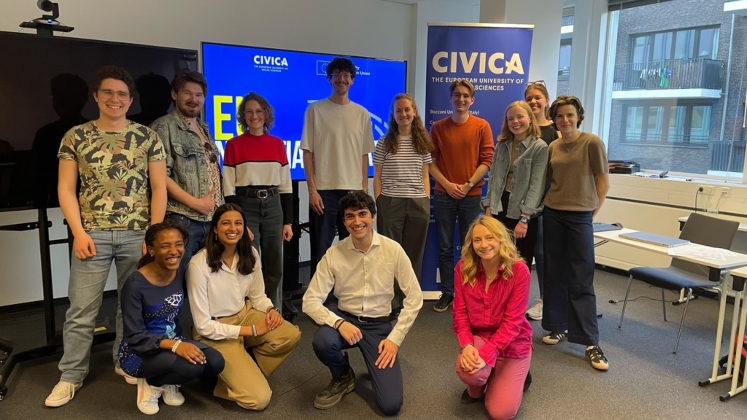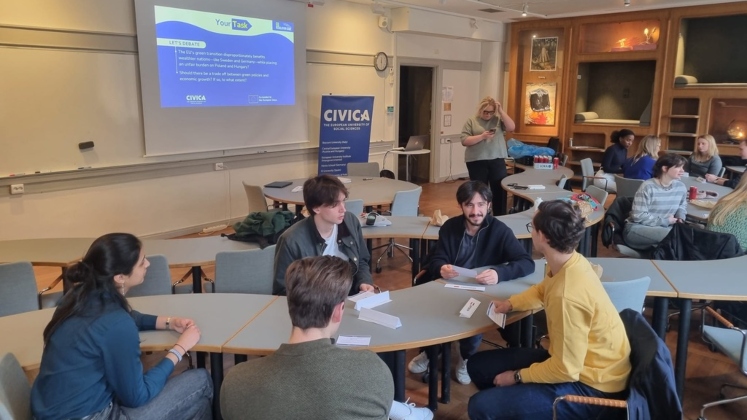The Student Engagement Fund (SEF) is a mini–grant intended to foster cross–campus collaboration among students and student associations from different disciplines and backgrounds at CIVICA institutions. Last autumn a selection of transnational teams from different CIVICA universities were awarded funding to pursue their distinctive projects in 2025.
We interviewed LSE Koshiki Chauhan who has been working on a unique EU Regulations Game with her team ↓
 Photos: Koshiki Chauhan
Photos: Koshiki Chauhan
Koshiki is currently studying for a BSc in Economics and Economic History and is on an exchange programme at the Stockholm School of Economics (SSE). She is looking to pursue a career in diplomacy and international development after graduating, and is particularly interested in the fields of conflict resolution and educational equality.
Why did you choose LSE and how did you hear about CIVICA and the student engagement fund?
I chose to study at LSE because of the vast range of opportunities it offers outside of individual degree programmes. From the numerous societies, to projects offered by the Volunteer Centre and LSE LIFE, there is so much for students to get involved in where they can meet others from different backgrounds, enhance their skillsets and figure out what they are truly interested in.
CIVICA stood out because I was already interested in seeking out international opportunities. Throughout my undergraduate degree I’ve been involved in CIVICA through the Engage Track, the Student Association Forum in Warsaw (where I met one of the team members behind this SEF project) and now on exchange at a partner university.
How did your project come about? How did you and other team members come up with the idea behind this project?
I met Lorenzo (one of the team members) at the Student Association Forum in Warsaw in 2023, and since I was coming on exchange to SSE (where he studies full time), he reached out to see if I was interested in partnering on a SEF project. From there, we developed the idea of the EU Negotiation Game (initially named the ‘EU Regulation Game’) with the aim of increasing awareness of EU decision-making and addressing low voter turnout amongst young Europeans.
We wanted to broaden knowledge around the EU as an institution and also create a game that would allow students to improve their negotiation skills in a relaxed environment. We partnered with two students from the Hertie School in Berlin (Virginia and Jackline) who collaborated with us on refining the game and building on feedback received at the first session held at SSE.
Could you summarize your team's project and share the highlights so far?
We held workshops at SSE in Stockholm and at Hertie School in Berlin. Since the first version of the game, we made several changes following student feedback. Thanks to those comments, we changed the name of the game to ‘EU Negotiation Game’ to better encapsulate the skills-based focus of the game. We also introduced a points-based system for the workshop at Hertie so that aims of each country were clearer. Finally, we also tested two different topics: the Green Transition at SSE and Migration Policy at Hertie to see whether students preferred more/less divisive topics.
I have really enjoyed seeing the project develop through an iterative process and loved collaborating with students with different academic and personal backgrounds. Seeing student engagement increase after our alterations was also fantastic as it showed we were on the right track!
What is your main takeaway from setting up this collaborative project? How do you hope this experience will benefit you (and other participants)?
Our long-term vision for this project was for it to be implemented in high schools, with workshops run at universities used to refine and improve the game mechanics. Looking back, doing all this in one academic term was quite ambitious. Our initial goal may not have been completely feasible, but the project has been a valuable learning experience for us and the participants. Hopefully, this project and the workshops have inspired students in Stockholm and Berlin to engage with EU issues, and it has taught them more about the roles of several EU institutions.
Why should future students take part in this opportunity? Would you recommend CIVICA to LSE students?
The Student Engagement Fund is a fantastic way for students from CIVICA universities to connect, and for LSE students, it’s a great way to engage with EU developments, issues and collaboration efforts.
Future students should really take advantage of this opportunity to build connections and friendships with other students in Europe who are studying different disciplines at different levels. If you are interested in international collaboration, European initiatives and travel opportunities, check what CIVICA has to offer.
For an overview of all the opportunities to engage with CIVICA, check the rest of our webpages here.
